By Church People – Workers Solidarity
Overview

What is Church Social Teaching?
Church social teaching is an instrument for “action in behalf of justice” and “participation to transform the world” in all its dimensions according to the vision of Jesus Christ. (St. Paul VI and St. John Paul II). It is a declaration of the beliefs and principles of the Church regarding social justice for workers that have to be painstakingly followed to ensure their welfare and dignity.
Pope Francis reminds all the faithful that no one can demand that “religion should be relegated to the inner sanctum of personal life, without influence on societal and national life” (Evangelii Gaudium, No. 183). Moreover, speaking to young people at Rio de Janiero, he urged young Catholics to shake up the church and “make a mess” in their dioceses by going out into the streets to spread the faith:
“I want to see the church get closer to the people. I want to get rid of clericalism, the mundane, this closing ourselves off within ourselves, in our parishes, schools or structures. Because these need to get out! We need to come out of ourselves and head for the periphery. We need to avoid the spiritual sickness of a Church that is wrapped up in its own world!”
CST is a Key to Catholic Identity
Integral to Catholic faith, the social justice dimensions of teaching are integral to Catholic education and catechesis. They are an essential part of Catholic identity and formation.
“The central message is simple: our faith is profoundly social. We cannot be called truly ‘Catholic’ unless we hear and heed the Church’s call to serve those in need and work for justice and peace.” (Communities of Salt and Light, US Bishops, 1993).
What are the essential elements of Church Social Teaching?
The CST is continually developing its set of:
- Principles (See) where Catholics analyze/diagnose reality
- Criteria (Judge) where Catholics evaluate/judge reality
- Norms (Act) where Catholics as social agents make plans of action to promote changes in society.
Constitutive elements of the Church:
- Scripture – hearing the Good News
- Sacraments – worship, prayer, community, etc.
- Social Mission – call to action.
I. Principles or themes of Church Social Teachings
The church’s social teachings are born out of the “supreme commandment to love God and our neighbor in justice” (Congregation of the Doctrine of the Faith, 72). These principles point to us the “paths possible for building a good, authentic and renewed social life” (Congregation for Catholic Education, 47).
A. The Value of Work

The Old Testament presents God as the omnipotent Creator (cf Gen 2:2; Job 38-41; Ps 104; Ps 147) who fashions man in his image and invites him to work the soil (cf. Gen 2:5-6), and cultivate and care for the garden of Eden in which he has placed him (cf. Gen 2:15). The Compendium of the Social Doctrine of the Church teaches the value of work:
- Work is a vocation for man. Work has a place of honor because it is a source of riches, or at least of the conditions for a decent life, and is, in principle, an effective instrument against poverty.
- In his preaching, Jesus teaches that we should appreciate work.
- In creation, human work becomes a service raised to the grandeur of God.
- Work represents a fundamental dimension of human existence as participation not only in the act of creation but also in that of redemption. In this perspective, work can be considered a means of sanctification and an enlivining of earthly duties.
- Work is essential for man’s full humanity, in his historical condition and his eschatological orientation. A society that deprives its people of work deprives them of their humanity.
- By means of work, man governs the world with God; together with God, he is its lord and accomplishes good things for himself and for others.
- Christians are called to work not only to provide themselves with bread, but also in acceptance of their poorer neighbors, to whom the Lord has commanded them to give food, drink, clothing, welcome, care and companionship (cf. Mt 25:35-36).
- Every worker, Saint Ambrose contends, is the hand of Christ that continues to create and to do good for the community.
The encyclical Laborem Exercens is clear on the importance of work to man: “Through work, man must earn his daily bread.” Work is “one of the characteristics that distinguish man from the rest of creatures… man’s life is built up every day from work; from work it derives its specific dignity.”
Such is the value of work that Pope Benedict highlights the link between joblessness and poverty:
“In many cases, poverty results from a violation of the dignity of human work, either because work opportunities are limited (through unemployment or underemployment), or because a low value is put on work and the rights that flow from it, especially the right to a just wage and to the personal security of the worker and his or her family.”
Caritas in Veritate, No. 63
The global economic system has led to the commodification of labor as well as goods; and current neoliberal policies underpinning the prevailing economic order has driven movement of peoples and goods from developing to developed countries. The Philippines is one example within a broader context of labor commodification and exploitation on an international level. It is one of the largest sending countries of migrant workers, with some 1.5 million Filipinos leaving the country every year.
B. Human Dignity
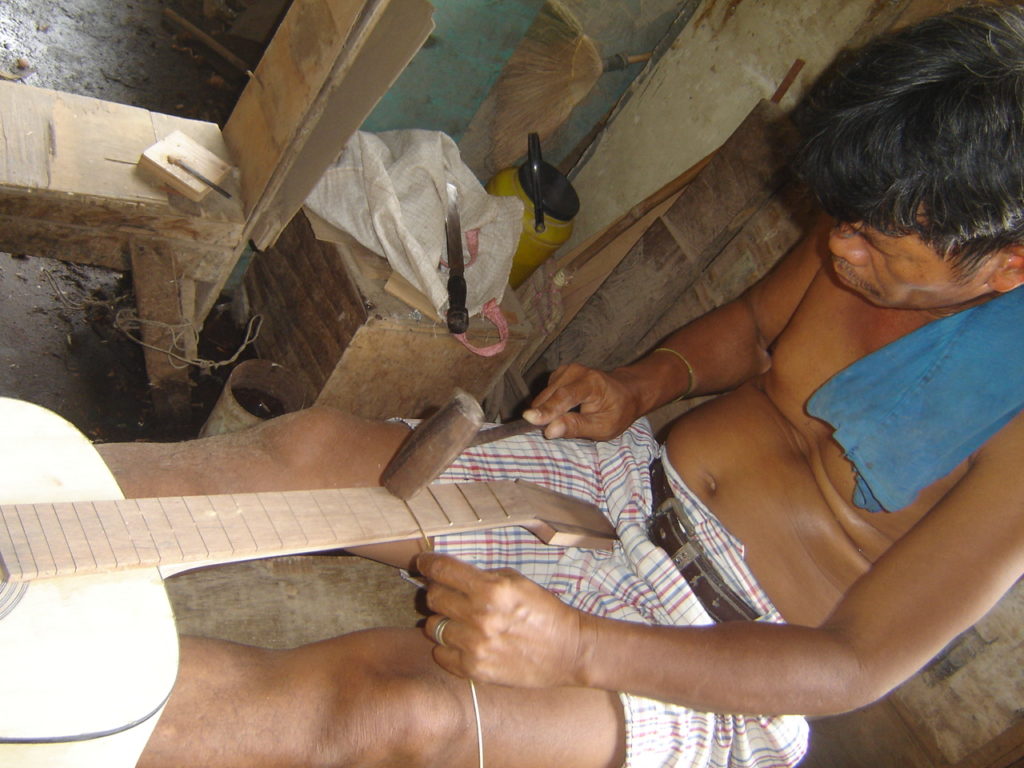
- All of us “enjoy an equal dignity” for we are all created in the image of one God (Catechism of the Catholic Church, 1934). However, reality tells us that discrimination and social exclusion remains prevalent in our society. Day after day we witness an ever increasing number of Filipinos who experience dehumanizing poverty, hunger, joblessness, and landlessness: all contributed significantly in the loss of human dignity.
- If we fail to realize that people have dignity, St. John XXIII said that “there can be neither justice nor peace in the world” (Mater et Magistra, 21).
- “The Church speaks out on behalf of the dignity of the human person, created in the image of God and redeemed by Jesus Christ… The human person must live, in the concrete reality of his/her daily life, according to the dignity that is his/hers.” (St. John Paul II)
- Work should be more inclusive and open, not exclusive and divisive. At the same time, it should uphold the dignity of workers.
- Society has a moral obligation, including governmental action where necessary, to assure opportunity, meet basic human needs, and pursue justice in economic life. (US Catholic Bishops, “A Framework for Economic Life”)
- The State must ensure wage levels adequate for the maintenance of the worker and his family, including a certain amount for savings. (St. John Paul II)
C. Common Good

- The common good “embraces the sum total of all those conditions of social life which enable individuals, families, and organizations to achieve complete and effective fulfillment.” (St. John XXIII)
- “Desire the common good and strive towards it” since “the more we strive to secure a common good corresponding to the real needs of our neighbors, the more effectively we love them.” (Pope Emeritus Benedict XVI)
- “The realization of the common good in the temporal order is the reason for being of the State or government. It has also the duty to protect the rights of all its people and particularly of its weaker members, the workers, women, and children.” (Mater et Magistra, 20)
- Economic decisions and institutions should be assessed according to whether they protect or undermine the dignity of the human person. Social and economic policies should foster the creation of jobs for all who can work with decent working conditions and just wages.
- In the Philippines, the principle of common good is far from reality. For example, the wealth of the 40 richest people grew over $13 billion to $43.4 billion in 2012. Meanwhile, the gap between the rich and poor has grown over the past year. While the country now has 15 billionaires, it also has some 11.2 million poor families.
D. Solidarity

- Solidarity is not a feeling of vague compassion or shallow distress at the misfortunes of so many people. It is in essence a firm and persevering determination to commit oneself to the common good; that is, to the good of all and of each individual, because we are all really responsible for all (Sollicitudo Rei Socialis, 38).
- There can be no progress towards the complete development of the human person, without the simultaneous development of all humanity, in the spirit of solidarity (Populorum Progressio, 43).
- Evangelization is “a complex process” that includes solidarity with those in need. And it is “unacceptable” to evangelize without addressing the urgent problems of poverty, injustice and oppression.
- “I would like to make an appeal to those in possession of greater resources, to public authorities and to all people of good will who are working for social justice: never tire of working for a more just world, marked by greater solidarity.” (Pope Francis)
- According to research group IBON, the 2015 National Expenditure Program (NEP) will benefit more rich families and big business groups. Through budgetary support for the Public-Private Partnership Program (PPP), these favored families and groups will continue to receive benefits under the pretext of infrastructure development. IBON added that some PhP57.2 billion in public funds have been allocated in the 2015 NEP to guarantee the profits of investors participating in Aquino’s PPP program, pay for onerous contracts, and facilitate the implementation of more PPP projects.
E. Option for the Poor
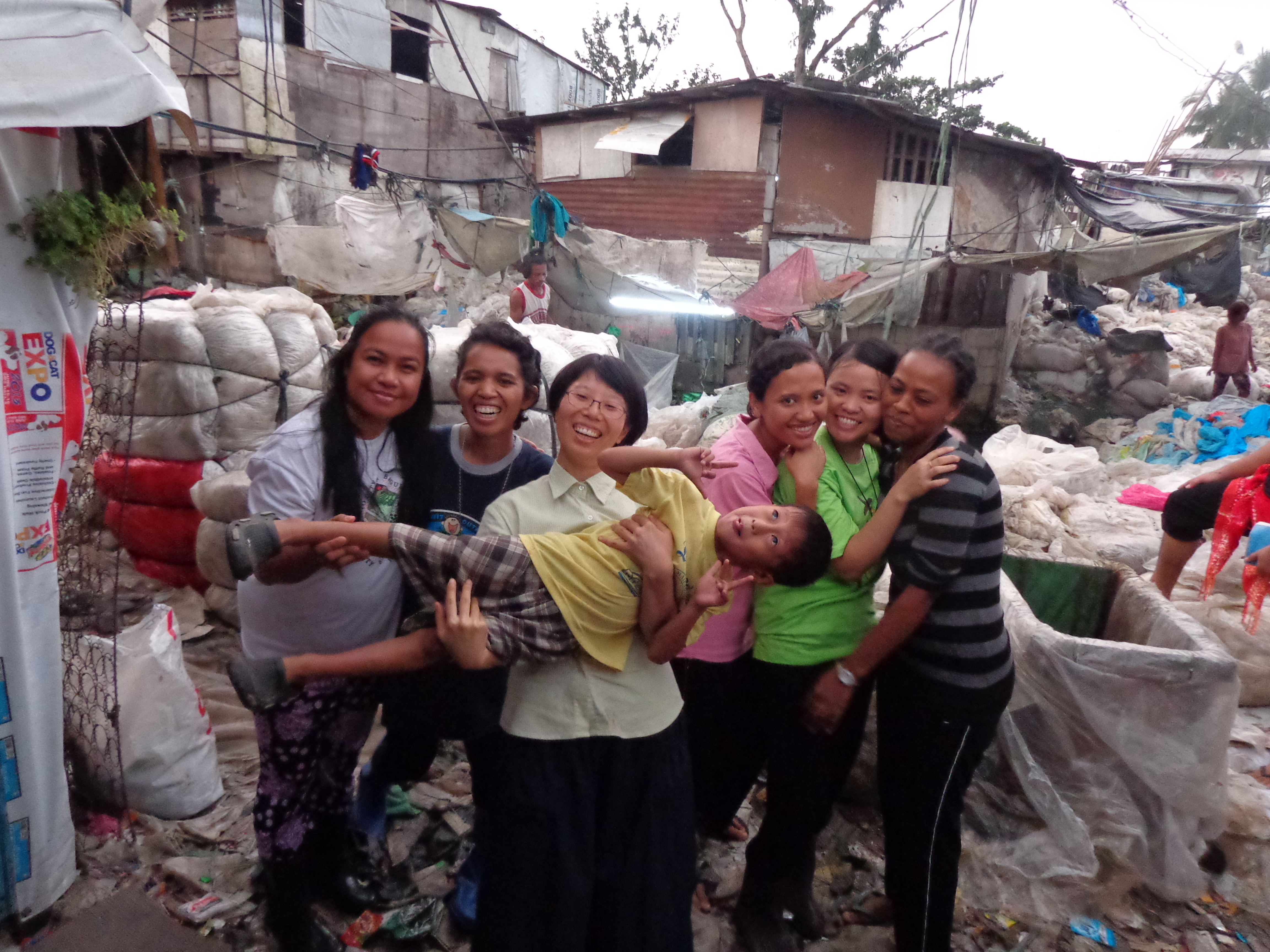
- “The Church proclaims her preference for the poor within the totality of her mission of evangelization… so that all may come to know Christ and find in the love of God and of neighbor their highest fulfillment.” (St. John Paul II)
- How could one be happy and be fulfilled when one sees the suffering of one’s fellow human being, when one sees families homeless and hungry?
- The church must listen to the “cry of those oppressed by unjust systems and structures,” to hear the “appeal of a world that contradicts the plan of the Creator.” The church then must “proclaim the Good News to the poor, freedom to the oppressed, and joy to the afflicted.” (Justitia in Mundo, 5)
- “Feed the people dying of hunger, because if you do not feed them you are killing them.” (Gaudium et Spes, 69)
- The option for the poor principle states that “the deprivation and powerlessness of the poor wounds the whole community. The extent of their suffering is a measure of how far we are from being a true community of persons” (Economic Justice for All, 88). We are judged according to how we take care of the most vulnerable members of our community.
F. Other Themes of the Catholic Social Teaching

- Community – emphasizes the social nature of the human person.
- Rights and Duties – citizens have political and economic rights and duty to serve one’s neighbor.
- Participation – all human beings have the right to participate in the economic, political, cultural life of the community.
- Economic Justice – the economy must serve the people; people are more important than things; labor is more important than capital.
- Stewardship of Creation – care for environment, sustainable development.
- Role of Government – the State has a positive moral function: an instrument to promote human dignity, protect human rights and build the common good. The government has the obligation to provide decent work and just wage for its citizens within the country. The government should legislate more laws in favor of the workers and implement them decisively.
- Promotion of Peace – peace based on justice.
- On Child Labor – Pope Leo XIII issued the warning: “In regard to children, great care should be taken not to place them in workshops and factories until their bodies and minds are sufficiently developed. The Church’s social doctrine condemns the increase in the “exploitation of children in the workplace in conditions of veritable slavery.”
But in the Philippines, the Department of Labor and Employment (DOLE-7) Technical Support and Services Division said that there are a number of factories and haciendas in Central Visayas that practice child labor. There are also the so-called “worst forms of child labor.” Of the more than four million children involved in child labor in the country, many of them work in mining, sugar plantations, and even as sex slaves, and as drug sellers. Industries use and exploit them to lower production cost and increase profits. They work away from their families with the promise of God
II. Church’s Social Teachings on the Economic Activity of Man

There are three fundamental teachings of the Church on the economic life of man:
- The human person is the source and purpose of all economic life.
- All of earth’s goods are intended by God for everyone.
- Globalization should promote solidarity of all peoples and should not marginalize members of the human family. However, the Aquino government continues to embrace a neoliberal kind of globalization, repeating its mantra of privatization, liberalization, and deregulation. For more than two decades, this type of globalization resulted to massive unemployment, contractualization, inequality, and injustice. Obviously, this “globalization of greed” favors more big foreign companies and reduces people to mere commodities.
The goal and purpose of economic life.

The economy must serve the needs and welfare of all people:
- “The beginning, the subject and the goal of all social institutions is and must be the human person.” (Octogesima Adveniens, 14)
- “It is unfortunate that… a system has been constructed which considers profit as the key motive for economic progress, competition as the supreme law of economics, and private ownership of the means of production as an absolute right that has no limits… This unchecked liberalism leads to dictatorship rightly denounced by Pius XI as producing “the international imperialism of money.” One must recallr that the economy is at the service of the people.” (Populorum Progressio, 26)
- Economic growth in the Philippines is becoming more exclusionary with every year of the Aquino administration. The year 2013 has seen more rapid economic growth, rising investment, and praise from international agencies and big business – yet unprecedented record unemployment, falling job generation, soaring prices, growing poverty and stagnant incomes.
- “In development programs, the principle of centrality of the human person… must be preserved. The principal concern must be to improve the actual living conditions of the people; and the people who benefit from these programs ought to be directly involved in their planning and implementation.” (CV, 47)
Pope Francis pointed out the devastating effects of unjust economic systems on the lives of the poor:
- “We can no longer trust in the unseen forces and the invisible hand of the market. Growth in justice requires more than economic growth, while presupposing such growth: it requires decisions, program, mechanisms and processes specifically geared to a better distribution of income, the creation of sources of employment and an integral promotion of the poor which goes beyond a simple welfare mentality… the economy can no longer turn to remedies that are a new poison, such as attempting to increase profits by reducing the work force and thereby adding to the ranks of the excluded.”
- “As long as the problems of the poor are not radically resolved by rejecting the absolute autonomy of markets and financial speculation and by attacking the structural causes of inequality, no solution will be found for the world’s problems or, for that matter, to any problems. Inequality is the root of social ills.”
The goods of the earth are for all human beings and peoples.

The Principle on the Universal Destination of Goods is that, “God intended the earth with everything contained in it for the use of all human beings and peoples. Thus, under the leadership of justice and in the company of charity created goods should be in abundance for all. (GS, 69)
“The growth of wealth and the moral demands of an equitable distribution of these, must inspire society as a whole to practice the virtue of solidarity, in order to combat, in a spirit of justice and charity, those structures of sin.” (St. John Paul II, SRS, 36)
The release of the latest poverty statistics in 2013 further confirmed the economy’s duality. The economy grew by an average of five percent annually between 2006 and 2012 and expanded by 33.8 percent over the entire period. GDP per capita in turn increased by 21.5 percent from PhP54,226 in 2006 to PhP65,904 in 2012. And yet despite these, the official number of poor families increased 405,638 or by 10.6 percent to 4.2 million in 2012; the number of poor Filipinos increased 1.1 million or by 4.9 percent over the same period to 23.7 million. IBON approximates around 66 million Filipinos or 70 percent of the population struggling to survive on some PhP100 or much less daily.
Globalization should promote solidarity and equality among all peoples

“Injustice reigns when some nations accumulate riches and live in abundance while other nations cannot offer the majority of the people the basic necessities. Injustice reigns when within the same society some groups hold most of the wealth and power while large strata of the population cannot decently provide for the livelihood of their families even through long hours of backbreaking labor in factories or in the fields.”
St. John Paul II
- One must see the risks connected with the new dimensions of commercial and financial relations.
- “There is increasing inequalities, both between advanced countries and developing countries, and within industrialized countries. The growing economic wealth made possible by the processes described above is accompanied by an increase in relative poverty” (Compendium of the Social Doctrine of the Church, 362)
- The challenge is to ensure “a globalization in solidarity, a globalization without marginalization.” (CSDC, 363)
- There must be an ethical criteria that should form the basis of international economic relations. (CSDC 364)
- The pursuit of the common good and the universal destination of goods.
- Equity in trade relations.
- Attention to the rights and needs of the poor in policies concerning trade and international cooperation. Otherwise, “the poor nations remain ever poor while the rich ones become still richer.” (PP, 57)
- The socio-economic crisis for tens of millions of Filipinos occurs amid growing prosperity for a very few. The net income of Philippine Stock Exchange (PSE)-listed firms rose from PhP438.1 billion in 2010 to PhP501.3 billion in 2012. The net income of the country’s Top 1000 corporations has been growing at an increasing rate in the latest three years for which data is available – their cumulative net income has gone up from PhP756 billion in 2009, to PhP804.1 billion in 2010 and to PhP868.1 billion in 2011.
- The collective net worth of the 40 richest Filipinos has been steadily increasing from US$22.8 billion in 2010, to US$34 billion in 2011, and further to US$47.4 billion in 2012. These oligarchs’ business interests dominate the country’s real estate, ports, construction, trade, power, water, telecommunication, transport, mining, banking and finance, and food and beverage industries.
- In 1985, the top 20 percent of families cornered 52.1 percent of total family income leaving the bottom 80 percent to divide the remaining 47.9 percent between them. This has barely changed over the last decades of supposed democracy and in 2009, the top 20 percent of families still claimed 51.9 percent of total family income (with the bottom 80 percent dividing the remaining 48.1 percent).
III. The Church’s Social Teachings on Labor

Saint John Paul II, speaking to workers, tricyle and jeepney drivers in Legazpi in 1981 said, “Our response to God’s gift of the land is made with human effort and work… Your work is noble because it is a service for your families and for the wider community, which is society. Work is a service in which one grows to the extent to which he/she gives himself/herself for others.” Human work is the key to the solution… of the whole “social question”. (LE, 3)
A. Human Labor is not a commodity. Work and the workers have dignity.
As human persons, we are created in God’s image and are God’s co-creators:
- “We are given the mandate to transform the earth. By our labor we are unfolding the Creator’s work and contributing to the realization of God’s plan on earth.” (LE, 25)
- “Working people have been giver over, isolated and defenseless, to the callousness of employers and the greed of unrestrained competition.” (Rerum Novarum, 2)
- “Labor has become “a commodity to be freely brought and sold on the market, its price determined by the law of supply and demand.” (Centesimus Annus, 4)
- “Work… must be regarded not merely as a commodity, but as a specifically human activity.” (Mater et Magistra, 18)
- St. John Paul II for his part, reiterated that up to the present, “certain objectives stated by Rerum Novarum remain valid, and… still constitute a goal yet to be reached, if man’s work and his very being are not to be reduced to the level of a mere commodity.” (CA, 34)
- “All violations of the integrity of the human person… all offenses against human dignity, such as subhuman living conditions… degrading working conditions where men/women are treated as mere tools for profit, rather than as free and responsible persons: all these and the like are criminal: they poison civilization.” (Gaudium et Spes, 27)
Labor has priority over capital

The Church’s doctrines stress that labor has an inherent priority over capital. In the production process, “labor is always a primary efficient cause, while capital, the whole collection of means of production, remains a mere instrument or instrumental cause.” (LE, 12)
- Without labor, production would not be possible.
- Even if labor is the creator of wealth, the worker has been mired in poverty and want.
- Pope Pius XI: “Capital… claimed all the products and profits and left to the laborer the barest minimum necessary to repair his strength and to ensure the continuation of his class.”
- Pope Pius XI deplored an “economic law” which says “all accumulation of riches must fall to the share of the wealthy, while the workingman must remain perpetually in indigence or reduced to the minimum needed for existence.” (Quadragesimo Anno, 54)
Workers have rights and duties

- St. John Paul II reminded us, “Love for others, and especially for the poor, is made concrete by promoting justice.” (CA, 58)
- Pope Benedict XVI explained that we can only be charitable after being just to our neighbor. “I cannot ‘give’ what is mine to the other, without first giving him what pertains to him in justice.” (CV, 6)
- Thus, loving our brothers and sisters — the workers — means being just to them by upholding their rights as workers, as God’s co-creators.
- The rights of workers, like all other rights, are based on the nature of the human person and on his transcendent dignity. (CSDC, 301)
The rights of workers

The church lists some of the workers’ rights:
- The right to work
- The right to a just wage
- The right to rest
- The right “to a working environment and to manufacturing processes which are not harmful to the workers’ physical health or to their moral integrity.”
- The right to appropriate subsidies that are necessary for the subsistence of unemployed workers and their families
- The right to a pension and to insurance for old age, sickness, and in case of work-related accidents
- The right to social security connected with maternity
- The right to assemble and form associations
Workers have the right to work and full employment

- All people have the right to work, to a chance to develop their qualities and their personalities in the exercise of their professions. (OA, 14)
- “Employment problems challenge the responsibility of the State, whose duty… is to promote active employment policies, that is, policies that will encourage the creation of employment opportunities within the national territory.” (CSDC, 291)
- “A fundamental concern of one and all – rulers, labor leaders and businessmen – must be this: to give work to everyone. (St. John Paul II)
- “Providing employment must not be taken lightly, or considered a secondary aspect of the economic order and of development. It should be a central element in the aims of economic theory and practice.” (St. John Paul II)
- The availability of jobs and the earnings they pay are essential to individual well-being: “Situations of unemployment have material and spiritual repercussions on families…” (CSDC, 295)
- Good jobs provide people with a chance to fulfill their ambitions, to develop their skills and abilities, to feel useful in society and to build self-esteem.
- Jobs shape personal identity and create opportunities for social relationship. Work is a source of pride and dignity.
- “Work is a good belonging to all people and must be made available to all who are capable of engaging in it. “Full employment” therefore remains a mandatory objective of every economic system oriented towards justice and the common good.” (CSDC, 288)
- A society in which the right to work is thwarted or systematically denied, and in which economic policies do not allow workers to reach satisfactory levels of employment, “cannot be justified from an ethical point of view, nor can that society attain social peace.” (CA, 43)
- However, because of joblessness, OFWs have been continuously increasing. From 866,590 back in 2011, total deployment of Filipino migrant workers have increased to 1,850,463. In 2013, the total number of migrant workers reached the two million mark, or an estimated 5,031 Filipinos leave the country everyday. The biggest in history.
- The migrant workers support network Migrante noted that at least one-fourth of the country’s labor force has gone abroad to find work, while 64.3 percent of unemployed Filipinos were actively looking for jobs abroad as shown in the Labor Force Survey.
- This figure can only be attributed to the Aquino government’s more aggressive labor export policy that thrives on the desperation of Filipino workers and professionals.
Workers have right to just remuneration
The Compendium of the Social Doctrine of the Church says, “Remuneration is the most important means for achieving justice in work relationships. They commit injustice who refuse to pay a just compensation or who do not give it in due time and in proportion to the work done.” (CSDC, 302)
- When discussing wages, Pope Leo XIII stated that a worker who accepts less than a living wage “because an employer or contractor will give him no better,” is “the victim of force and injustice.” (RN, 34)
- “We consider it our duty to reaffirm that the remuneration of work is not something that can be left to the laws of the marketplace; nor should it be a decision left to the will of the more powerful. It must be determined in accordance with justice and equity; which means that workers must be paid a wage which allows them to live a truly human life.” (MM, 71)
- “Workers not only want fair pay, they also want to share in the responsibility and creativity of the very work process.” (St. John Paul II)
- The workers could also participate in ownership, management, and profits: “It is especially desirable that workers gradually come to share in the ownership of their company, by ways and in the manner that seem most suitable.” (MM, 77)
- The teaching on the universal destination of goods means that “The means of production… cannot be possessed against labor… the means of production should serve labor… One cannot exclude the (possibility of) socialization, in suitable conditions, of certain means of production.” (Laborem Exercens, 14)

In the Philippines, amid high unemployment and meager wages, the increase in profits of the country’s biggest corporations is far exceeding the growth in their workers’ wages:
- Data from the Philippine Stock Exchange (PSE) shows that the combined net incomes of listed firms grew by 18 percent to PhP377.12 billion in January to September 2012 from PhP319.97 billion in the same period the previous year. Another study showed that in 2012, several listed firms posted a 35.9 percent increase in earnings.
- While big business saw its income and profitability grow, the increase in the wages of its workers was and continues to be insignificant. The average daily basic pay in agriculture increased by only four percent in 2010-2011, but the estimated daily net income of top 1,000 corporations in agriculture went up by 821 percent. In mining, average wages increased by only 3.8 percent, while mining firms recorded a 134 percent increase in profits. Such was also the case with most of the so-called growth sectors: electricity, gas, and water; wholesale and retail trade; and real estate, renting and business activities.
- The corporate income and profitability are growing more. From 2010-2011, the top 1,000 corporations gained an average annual income of Php780.02 billion compared to an average of PhP421 billion yearly during the previous administration. The profitability of big business under the Aquino administration is also higher at an average of 11.1 percent annually.
- On the other hand, the International Labor Organization (ILO) ranked the average monthly wages in the Philippines as the third lowest among 72 countries in the world, at US$279 (or some Php11,700).
- Philippine wages only surpassed average wages received in Tajikistan and Pakistan. This is despite increasing workers’ productivity, which increased by 5.37 percent in 2011-2012. The overall daily basic pay, meanwhile, increased by a mere 3.6 percent.
- Independent think-tank IBON Foundation puts the living wage at 1,051 as of August 2014. The current minimum wage in the National Capital Region as of September 2014, which is the highest in the country, only P466. That means the minimum wage is less than half of the living wage.
- The government has for years refused to come up with computations of the living wage. Instead, it has contented itself with computations of poverty threshold, saying PhP43.00 is enough for a person to be considered as “not poor”. Instead of comparing the minimum wage with a living wave, the government is now comparing it with a poverty threshold.
- The government’s mechanism for increasing wages. the regional wage boards, implement meager wage adjustments almost every year. Such adjustments do not move the minimum wage closer to a living wage. As such, workers are demanding a significant wage hike.
Workers have a right to a safe working environment/manufacturing processes

“The right to a working environment and to manufacturing processes which are not harmful to the workers’ physical health or to their moral integrity (should not be overlooked)… Besides wages, various social benefits intended to ensure the life and health of workers and their families are necessary.” – Laborem Exercens, 19
The expenses involved in health care, especially in the case of accidents at work, demand that medical assistance should be easily available for workers and that as far as possible it should be cheap or even free of charge. (LE, 19)
“Decent work” according to the ILO: opportunities for men and women to obtain decent and productive work in conditions of freedom, equity, security and human dignity. (2003).
- Job safety and the ethics in workplace.
- The income and benefits from employment.
- Job security and social protection.
- Social dialogue.
- Workplace relationship and job motivation.
ILO also highlights the Six Dimensions of Decent Work, as follows:
- Opportunities for work – the ability of every man and woman who wants to work to be able to find work.
- Productive work – work that ensures sustainable development and provides acceptable livelihoods for workers and their families.
- The fact that workers should be freely chosen and not forced.
- That workers should be free to join workers’ organizations/unions.
- Absence of discrimination and the unequal treatment of workers.
- Health of workers and their families should be safeguarded, with adequate protection provided in the event of illness or other contingencies.
In the Philippines, many employers are peso-pinching when it comes to workers’ health and safety at the workplace. As a result, many accidents occur in the workplace that harm or even kill workers.
The government is complicit in this, failing to punish erring employers. It also implements Department of Labor and Employment Order No. 57-04, which allows companies that employ more than 200 workers to conduct self-assessments when it comes to workers’ health and safety.
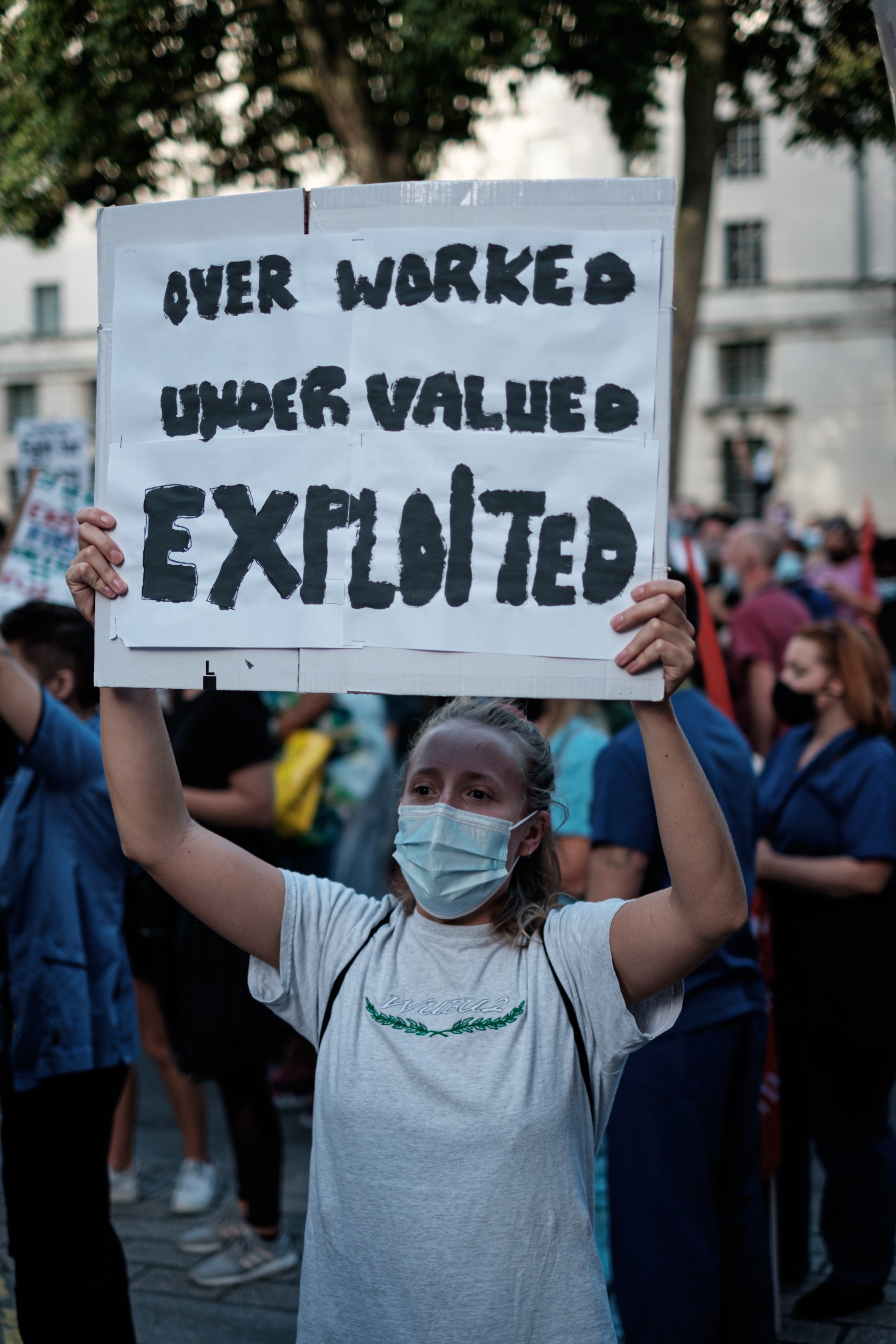
Workers have rights to form unions and associations
In order to promote and defend their rights, the workers have a right to form associations or labor unions. The Church recognizes the fundamental role played by labor unions, whose existence is connected with the right to form associations or unions to defend the vital interests of workers employed in the various professions.
- “Among the basic rights of the human person is to be numbered the right right of freely founding unions for working people.” (Church in the Modern World, 68)
- Unions “grew up from the struggle of the workers – workers in general, but especially the industrial workers – to protect their just rights vis-à-vis the entrepreneurs and the owners of the means of production.” (LE, 20)
- Such organizations, while pursuing their specific purpose with regard to the common good, are a positive influence for social order and solidarity, and are therefore an indispensable element of social life. (CSDC, 305)
Over the years, unfair labor policies and practicies such as contractualization makes it more difficult for workers to form unions and/or associations. This is because while most contractuals are maintained by companies longer than the period stated in their contracts, contractuals can be removed from work easily and at any time.
In 120 years that passed since Rerum Novarum – which promoted the right of workers to organize associations – we are saddened that in Mactan Export Processing Zone in Cebu and in other Export Processing Zones in the country, there is not even a single viable labor union.
Availing of laws that are biased in their favor, employers have been illegally dismissing workers once they find out that the latter are forming unions.
Pope Benedict XVI exhorts, “Repeated calls issued within the Church’s social doctrine, beginning with Rerum Novarum, for the promotion of workers’ associations… must be honored today even more than in the past.” (CV, 25)
Workers have the right to strike
Connected to the right to form unions is the right to strike. The Church’s social doctrine recognizes the legitimacy of striking “When it cannot be avoided, or at least when it is necessary to obtain a proportionate benefit,” (CCC, 2435) when every other method for the resolution of disputes has been ineffectual. (GS, 68; LE, 20; CCC, 2430)
Striking, one of the most difficult victories won by labor union associations, may be defined as “The collective and concerted refusal on the part of workers to continue rendering their services, for the purpose of obtaining by means of such pressure exerted on their employers, the State or on public opinion for just wages, better working conditions or an improvement in their social status.”
- “One of the methods used by unions is the strike, or work stoppage – a means that is recognized by the Catholic social teaching as legitimate under the proper conditions and within proper limits. Workers should be assured of the right to strike without fear of penalty. (On Human Work, 20)
- The violation of the right to organize and to strike is frowned upon by St. John Paul II who said that “It has been the constant teaching of the Church that workers have a right to unite in free associations for the purpose of defending their interest and contributing as responsible partners to the common good. Such associations should be protected by appropriate laws which should guarantee the free pursuit of the social welfare of all their members and of the workers in general.”
The following are systematic violations of the fundamental rights of workers:
- Contractualization has violated the workers’ right to gainful employment/security of tenure.
- Unjust compensation and unsafe working conditions have dehumanized our toiling brothers and sisters.
- Moreover, the workers’ rights to organize labor unions and to strike are being grossly violated in the Philippine setting.
- The government’s power to assume jurisdiction over labor disputes means that workers will be ordered to go back to work or face layoff and face criminal charges. It also means bringing the military and the police into the workplace.
C. The duties of workers and labor unions

The Compendium of the Social Doctrine of the Church is clear regarding the duties of labor unions: to “defend the vital interests of workers employed in the various professions.” However, this can only be achieved through cooperation – “hatred and attempts to eliminate the other are completely unacceptable.” Seen from this perspective, unions become “promoters of the struggle for social justice, for the rights of workers in their particular professions.”
IV. The conditions of our workers in the mining industry and the Church Social Teachings on mining

While utilizing God-given resources for the people’s needs, we must always remember that we are stewards of God’s creation. We must defend and protect Mother Nature and the human persons who live and work in this planet.
- Blessed John Paul II, however, lamented the “tendency towards an ‘ill-considered’ exploitation of the resources of creation.”
- “(The) conquest and exploitation of resources has become predominant and invasive, and today it has even reached the point of threatening the environment’s hospitable aspect: the environment as ‘resource’ risks threatening the environment as ‘home’.” (JPII, The Environment and Health, March 1997)
- A central point of reference for every scientific and technological application is respect for men and women, which must also be accompanied by a necessary attitude of respect for other living creatures. (CSDC, 459)
V. The Church Social Teaching on Immigration/Migrants
The CSDC states, “In the modern world, where there are still grave inequalities between rich countries and poor countries, and where advances in communications quickly reduce distances, the immigration of people looking for a better life is on the increase. These people come from less privileged areas of the earth and their arrival in developed countries is often perceived as a threat to the high levels of… economic growth.” (CSDC, 297)
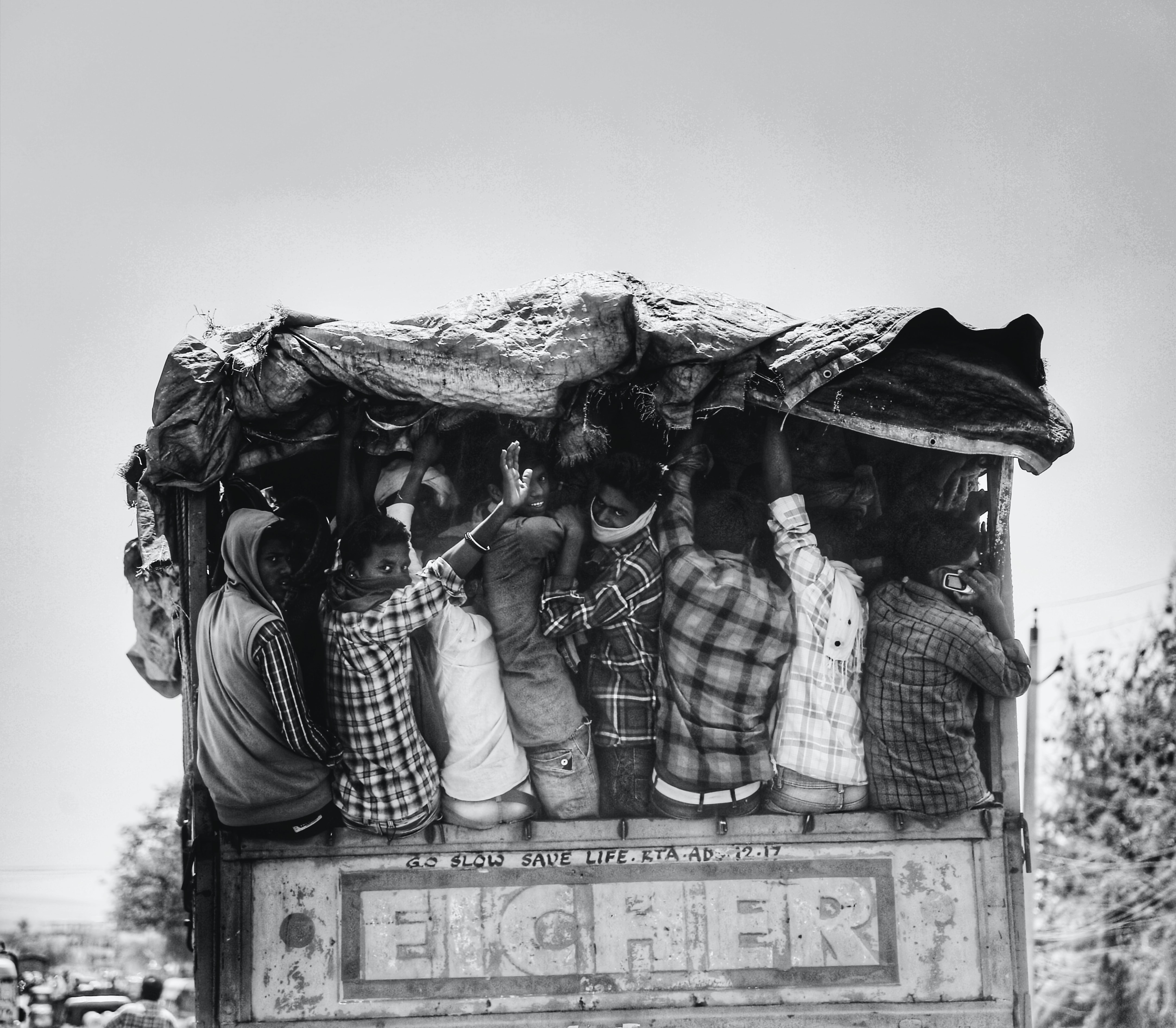
- “Emigration in search for work must in no way become an opportunity for financial or social exploitation. As regards the work relationship, the same criteria should be applied to immigrant workers as to all other workers in the society concerned.” (CSDC, 297)
- “Immigrants are to be received as persons and helped, together with their families, to become a part of societal life.” (CCC, 2241). “At the same time, conditions that foster increased work opportunities in people’s place of origin are to be promoted as much as possible.” (GS, 66)
- The Church condemns human trafficking and the violence on domestic helpers. These brutal acts are comparable to modern-day slavery. The government’s aggressive promotion of migration has further proliferated cases of human trafficking. An estimated 300,000 to 400,000 Filipinos who have been trafficked.
- Migrante International believes that the Philippines has also suffered socially from migration. Families experience social conflict and children are vulnerable without close supervision and support from parents. An estimated six million children in the Philippines are growing up with at least one absent parent which has been shown to affect children’s emotional and psychological well being. (UNICEF)
- There have been steady number of cases of Filipino migrant workers not getting the full promised wages once they reach their workplaces abroad, denied of day-offs, and even high rates of physical, sexual, and emotional abuse.
- The Aquino administration, while supposedly promoting local job generation as its core program to eliminate unemployment, continues to hail the “remittance boom” to further promote labor export. To do this, it has become more aggressive in lobbying for job markets abroad in the past four years.
- In search of jobs, higher wages and livelihood, the number of OFWs has increased significantly since BS Aquino took office. By 2012, at least one-fourth of the country’s labor force has gone abroad to find work. According to the Labor Department, there are now 12 million OFWs abroad. Migrante International pegs the number of overseas Filipinos between 12 to 15 million, to include undocumented OFWs. The International Organization for Migration (IOM) still places the Philippines as the fourth leading migrant-sending country in the world, next only to China, Mexico, and India.
VI. The Church Social Teachings on workers participation in social/economic life
A. Violation of Workers’ Rights

The teachings of the church point to the “Structures of sin… which generate and perpetuate poverty, underdevelopment and degradation. These structures are built and strengthened by numerous concrete acts of human selfishness.” (CSDC, 332)
Pope Francis identified clearly the root of the problem:
“We have created new idols. The worship of the ancient golden calf has returned in a new and ruthless guise in the idolatry of money and the dictatorship of an impersonal economy lacking a truly human purpose… to sustain a lifestyle which excludes others, or to sustain enthusiasm for that selfish ideal, a globalization of indifference has developed. Almost without being aware of it, we end up being incapable of feeling compassion at the outcry of the poor, weeping for other people’s pain, and feeling a need to help them, as though all this were someone else’s responsibility and not our own.” Evangelii Gaudium, 54
- To combat this social evil, everyone must work to promote the right of workers to participate in governance and decision-making in society.
- “Everyone has the right to participate in economic life and the duty to contribute, each according to his own capacity to the progress of own country and to that of the entire human family.” (CSDC, 333)
- St. John XXIII reminded us of the urgency of giving everyone who works, his proper dignity by making him a true sharer in the work he does with others: “Every effort should be made that the enterprise become a community of persons in the dealings, activities and standing of all its members.” (PP 28)
B. The State’s role in the promotion of common good and the rights of the workers
The State can encourage citizens and businesses to promote the common good by enacting an economic policy that fosters the participation of all citizens in the activities of production. (CSDC, 354)

- Pope Francis reminds us that “Until exclusion and inequality in society and between peoples are reversed, it will be impossible to eliminate violence.” (Evangelii Gaudium, 59)
- But at present, this seems a difficult task since the present administration fully embraces neoliberal economic policies that promote liberalization, deregulation, contractualization, and privatization.
VII. Church of the Poor and becoming a Church of the Poor
The Second Plenary Council of the Philippines (PCP II) asserts that the local church should be a “church of the poor”. Moreover, Pope Francis speaking to an audience in Brazil remarked: “How I wish for a church that is poor and for the poor.”
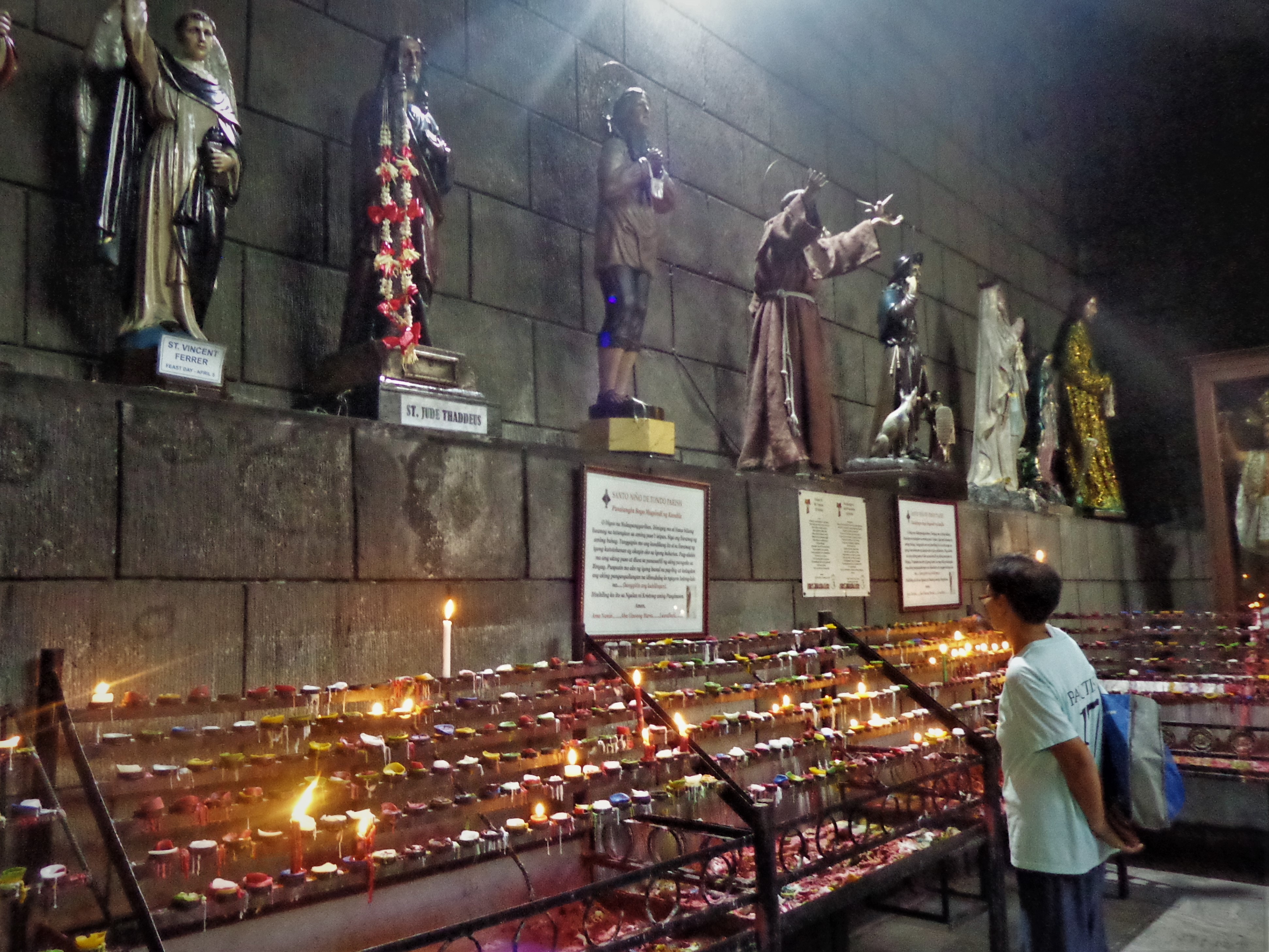
- The encyclical Economic Justice for All (EJA) guides us how to concretize this challenge: “As followers of Christ, we are challenged to make a fundamental “option for the poor” — to speak for the voiceless, to defend the defenseless, to assess lifestyles, policies, and social institutions in terms of their impact on the poor. As Christians, we are called to respond to the needs of all our brothers and sisters, but those with the greatest needs require the greatest response.” (EJA, 16)
- “Love for others, and especially for the poor, is made concrete by promoting justice.” (St. John Paul II)
- “The Church herself, the Church in Asia, in the Philippines, will heed the call of the Beatitudes and be the Church of the poor because she must do what Jesus did and proclaim the Gospel to the poor. Defending the human dignity of the poor and their hope for a human future is not a luxury for the Church, nor is it a strategy of opportunism, nor a means for bringing favor with the masses. It is her duty because it is God who wishes all human beings to live in accordance with the dignity that he bestowed on them.” (St. John Paul II)
- “There is a need for solidarity movements among and with the workers. The church is firmly committed to this cause, in fidelity to Christ, and to be truly the ‘church of the poor’.” (LE, 8)
- Failing to fulfill the great commandment to love our neighbor is a grievous sin. “One may sin by greed and the desire for power, but one may also sin in these matters through fear, indecision, and cowardice!” (SRS, 47)
VIII. The role of the bishops, priests, religious and laity in addressing social problems/issues

Pope Francis reminds us that the Church “cannot and must not remain on the sidelines in the fight for justice. All Christians, their pastors included, are called to show concern for the building of a better world.” (Lumen Fidei, 124)
A. Role of the Bishop
Our church doctrines say “In the particular Church, the primary responsibility for the pastoral commitment to evangelize the social realities falls to the Bishop, assisted by his priests, religious men and women, and the laity. With special reference to local realities, the Bishop is responsible for promoting the teaching and diffusion of the Church’s social doctrine, which he should do through appropriate institutions” (CSDC, 539). Pope Francis tells church leaders to serve the poor and the little ones:
“Let us try a little harder to take the first step and become involved. An evangelizing community gets involved by word and deed in people’s daily lives; it bridges distances, it is willing to abase itself if necessary, and it embraces human life, touching the suffering Christ in others. Evangelizers thus take the ‘smell of the sheep’ and the sheep are willing to hear their voice. An evangelizing community is also supportive, standing by people at every step of the way, no matter how difficult or lengthy this may prove to be… the disciple is ready to put his or her whole life on the line, even to accepting martyrdom.” (Evangelii Gaudium, 24)
B. The Role of the Clergy
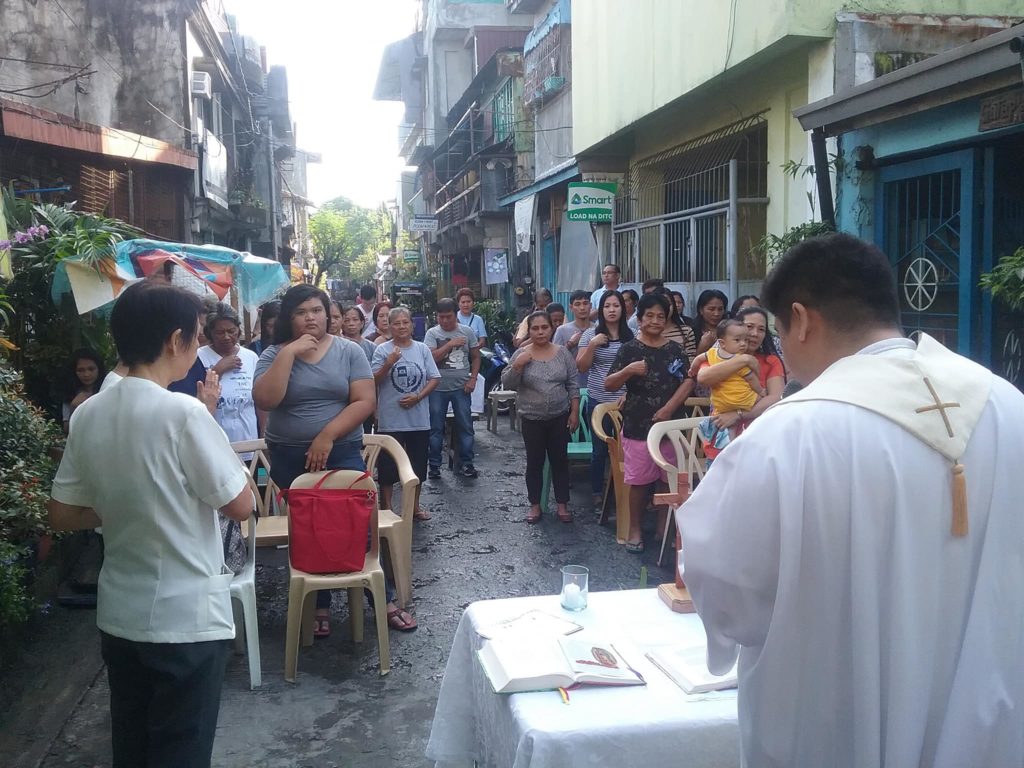
Through the servant-leadership of the priest, the people of God are inspired and formed to become an evangelizing and prophetic community. He makes real to the Christian community Christ’s love of and preference for the poor. (PCP 2, 525 and 527)
C. Role of the Religious
An urgent dimension is for the religious to have a passion for justice. Injustice must be attacked at its roots which are in the human heart by transforming these attitudes and habits which begets injustice and foster the structures of oppression. (PCP 2, 481)
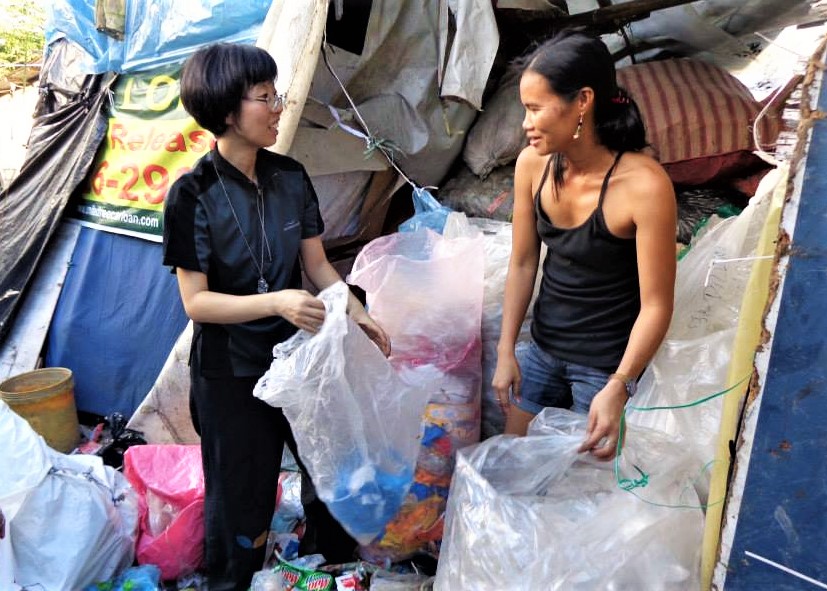
- Pope Francis challenged the religious to become true prophets: “Prophecy makes uproar, some say a mess… prophecy announces the spirit of the Gospel.”
- Francis also told the religious that he expected them to give special witness. For Francis, to be prophets means “going to the peripheries,” for “great changes in history were realized when reality was seen not from the center but rather from the periphery.
- Quoting Fr. Arrupe, SJ, Francis remarked: “Real contact with the poor is necessary: the need to become acquainted with reality by experience, to spend time walking on the periphery in order to become acquainted with the reality and life experiences of the people.”
D. Role of the Laity
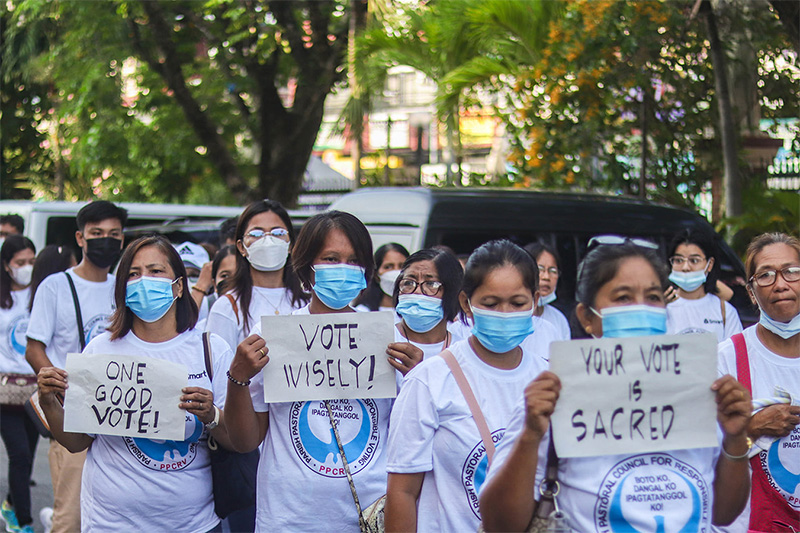
“The lay faithful are called – through their words and works, their engagement in each and every work and business of the earth, in each and every circumstance of their existence – to permeate the world with the teachings of Christ and to animate the temporal order with His Spirit.” (PCP 2, 427)
“The lay faithful are called to heal and transform society, to ever promote justice and peace, to prepare the temporal order for the final establishment of the Kingdom of God.” (PCP 2, 435)
IX. Summary of National Council of Churches in the Philippines (NCCP) Teachings on Labor
The Protestant churches has a rich history of supporting the workers’ right to work and organize unions. Along with these basic rights are the workers; right to receive just wages and to work in a safe and secure working environments. The church’s unrelenting support for the struggle of the working class is deeply rooted in the biblical tradition, specifically in the Old Testament. It is grounded upon the conviction that human beings are created in the image of God. The book of Deuteronomy reminds us “Not to take advantage of a hired man who is poor and needy… pay him his wages each day because he is poor and counting on it. Otherwise he may cry to the Lord against you, and you will be guilty of sin (Deut 23:22). The value of one’s work goes back even before the time of Abraham when man received God’s mandate to work in order to live. By productive toil, humankind was meant to realize dominion over all things by means of individual and collective employment of labor-power and creativity. Man’s work is blessed by God, hence it is something that is sacred. Man’s work allows him to undergo a productive engagement with nature – a venue by which man can actualize his full potential.
In the Philippine context, the NCCP laments the history of Filipino labor as “A history of massive suppression and exploitation of labor-power”, something that is very much similar to the “enslavement and subjugation of the people of God by the Egyptian pharaohs.” The exploitation of workers by big capitalists likened to chains that hinder “people’s creative energy.” Because of this, the Churches calls for an economic and political empowerment “that allows labor to safeguard its interests and to participate effectively in plotting the course of the nation.”
The characteristics of the Philippine labor sector:

- The labor sector includes all those hired by employers to create goods or to deliver services. These workers are “those who completely rely on wages for a living, those who are tied to the land but are hiring out their services in order to earn added income.” Workers can then be classified as industrial, service, and agricultural workers. Included in this labor sector are the overseas contract workers “who migrate to other countries in search of better working conditions.”
- Low level of pay or wages. The minimum wage set by the government is still far below the level needed to maintain a decent mode of existence. The government and employers have failed to effectively implement significant wage hikes for the past two decades. Worse, an increasing number of establishments grossly violate the legally mandated minimum wages. In a statement issued last 2001, the National Council of Churches in the Philippines (NCCP) expressed support for the call for a P125 legislated wage increase saying that in “These times of economic hardship brought about by skyrocketing prices of basic commodities, it is but just that workers get their due.”
- The right to work. The labor sector today is burdened with problems of unemployment, underemployment and job insecurity. Lack of jobs is the primary reason why millions of Filipinos look for jobs overseas every year. These job contracts separate them from their families, where they will have to work into oppressive and alienating working environments. According to a study paper prepared by the NCCP, labor export, a phenomenon very much similar to “situations of up-rootedness” in the Old Testament, is an “anomaly” which “demands justice, Christian compassion, and concrete programs of action.” Furthermore, unemployment in the country worsened because of unfair labor practices such as contractualization – a practice wherein “employers can easily lay off workers since there are enough reserves in the labor force to take over the jobs of those terminated.”
- Unsafe working and living environment. Thousands of workers work under hazardous conditions which lead to unnecessary deaths, accidents, sickness and disabilities. Others develop chronic and even terminal illnesses because of their exposure to unhealthy or dangerous work environments. Inhuman working conditions are more brutal in case of women workers. Various forms of physical, mental and sexual harassment persist in male-dominated work-places.
- The right to self-organization and empowerment. The right to form unions is crucial for the empowerment of workers. Labor unions help raise the critical consciousness of workers. Through labor unions, “Workers can develop their capacity to independently, effectively and creatively analyze their social problems, formulate solutions and plans, and carry them out.” By equipping workers with appropriate theory to guide their plans and actions, “Workers are encouraged to take the lead in controlling their fates and environment.”
Remedies on addressing the deplorable conditions of the Philippine labor sector:
- Persistent and unwavering demand for just wages. This must be accompanied by a concrete program of action which involves genuine nationalist industrialization, agrarian reform and agricultural development.
- Workers “should campaign for labor laws that ensure immediate implementation of job security upon employment, higher separation or termination pay, higher fines and sanctions from employees who dismiss employees without cause. Furthermore, workers should also “defend their right to strike and other collective protests in asserting their demands.”
- Workers should demand better health and safety conditions in their workplaces. They should be allowed to “participate in technical, scientific and/or social education programs to widen their social outlook and intellectual horizons.”
- The church and the whole ecumenical community “must support the struggle of labor for social justice in the form of living wages; adequate employment and livelihood opportunities; safe, healthy and humane living and working environment; trade union rights; self-organization and genuine empowerment.”
- The National Council for Churches in the Philippines (NCCP) in a Resolution to Support Workers’ Rights urged the churches themselves to “give just wages, ensure humane working conditions and the upliftment of their human dignity.” Moreover, the churches must also provide technical and material support, conduct education programs on the right of workers and management. In a Resolution on the Right of Labor to Strike, the NCCP expresses its “support for the inherent right of the people to shape their lives and their future.” The Council likewise encourages trade unionism “so that union members… can discover their potentials.” The Resolution also highlighted the right of industrial workers to strike “to gain better conditions as their ultimate weapon against exploitation or harassment.”
References
Bishop Gerardo A. Alminaza, DD. Church’s Social Teachings on Human Work, talk given on the 30th Anniversary of Laborem Exercens, National Conference of Church People and Workers, September 13, 2011.
Catechism of the Catholic Church, 1994.
Documents of the Second Plenary Council of the Philippines (PCP II), 1973.
Pontifical Council for Justice and Peace. Compendium of the Social Doctrine of the Church, 2004.
Pope Benedict XIV. Caritas in Veritate, 2006.
Pope Francis. Evangelii Gaudium, 2014.
Pope John XXIII. Mater et Magistra (Christianity and Social Progress), 1961.
_. Pacem in Terris (Peace on Earth), 1963.
Pope John Paul II. Centisimus Annus, 1991.
_. Laborem Exercens (On Human Work), 1981.
_. Sollicitudo Rei Socialis (On Social Concern), 1988.
_. The Environment and Health, 1997.
Pope Leo XIII. Rerum Novarum (1891).
Pope Paul VI. Evangelii Nuntiandi (Evangelization in the Modern World), 1975.
_. Octogesima Adveniens (A Call to Action), 1971.
_. Populorum Progression (The Development of Peoples), 1967.
Pope Pius XI. Quadregesimo Anno (Reconstruction of the Social Order), 1931.
Synod of Bishops. Justitia in Mundo (Justice in the World), 1971.
United States Conference of Catholic Bishops. Economic Justice for All, 1986.
__. Communities of Salt and Light, 1993.
Vatican II document. Gaudium et Spes (The Church in the Modern World), 1965.
For the whole month of May, we will be featuring the Catechism on Labor, a leaflet produced by the Church People-Workers Solidarity. This is a continuing series and is updated daily.
CWS is a non-profit organization. It is an ecumenical body composed of bishops, clergy, religious men and women, lay leaders and workers that spearhead in harnessing the church people’s initiatives towards solidarity with the workers. It engages in activities that truly reflect the oneness of the church with the workers’ life and aspirations.
For more information and to get involved with CWS, they can be reached through email at churchfortheworkers@gmail.com. Their office address is at CICM Guest House Building, No. 60, 14th Street, New Manila, Quezon City.
📸 Tim Mossholder (Unsplash), charlesdeluvio (Unsplash), Ritche T. Salgado O.Carm., Max Bohme (Unsplash), Ritche T. Salgado O.Carm., Ritche T. Salgado O.Carm., Alex Hudson (Unsplash), Falaq Lazuardi (Unsplash), Ritche T. Salgado O.Carm., Eric Wang (Unsplash), Rainier Ridao (Unsplash), Carter Yocham (Unsplash), Jason Goodman | Unsplash, Patrick Perkins (Unsplash), Ehimetalor Akhere Unuabona (Unsplash), Shubham Verma (Unsplash), Amir Arabshahi (Unsplash), Sujeeth Potla (Unsplash), Smartworks Coworking | Unsplash, Ritche T. Salgado, O.Carm., Caroline Hernand (Unsplash), Ritche T. Salgado O.Carm., Ritche T. Salgado O.Carm., PPCRV Lingayen-Dagupan, Tim Gouw | Pexels.
wow. this is so informative and timely, dear compilers. it updated me on church documents about the situation and rights of workers. thanks a lot!
Thank you, tita Pinky. God bless you always.